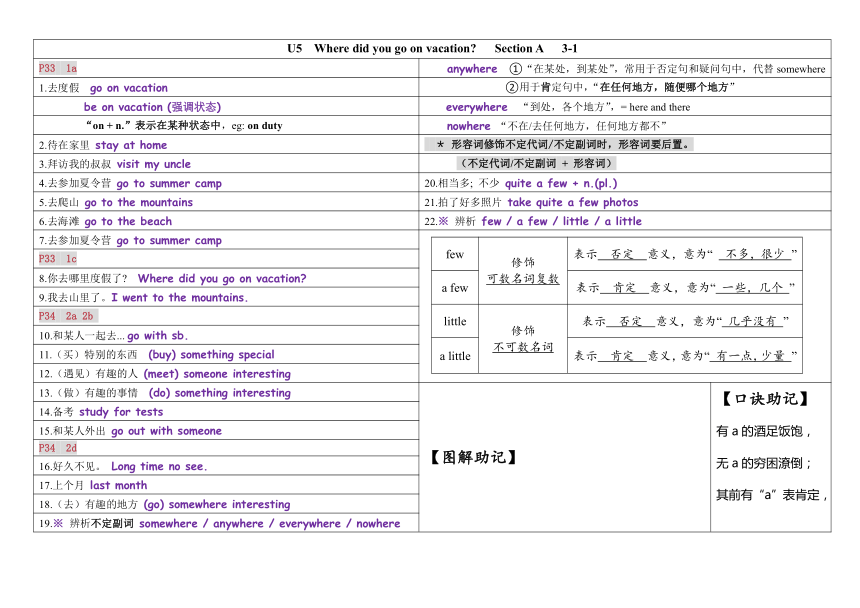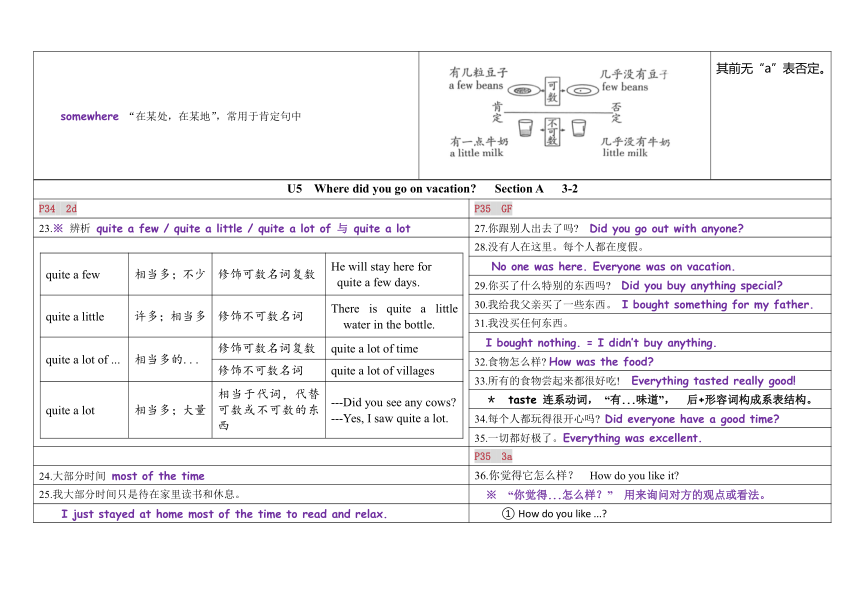鲁教版七年级上册Unit5 Where did you go on vacation?Section A短语
文档属性
| 名称 | 鲁教版七年级上册Unit5 Where did you go on vacation?Section A短语 |  | |
| 格式 | docx | ||
| 文件大小 | 100.5KB | ||
| 资源类型 | 教案 | ||
| 版本资源 | 鲁教版 | ||
| 科目 | 英语 | ||
| 更新时间 | 2024-01-15 14:40:44 | ||
图片预览


文档简介
U5 Where did you go on vacation Section A 3-1
P33 1a anywhere ①“在某处,到某处”,常用于否定句和疑问句中,代替somewhere
1.去度假 go on vacation ②用于肯定句中,“在任何地方,随便哪个地方”
be on vacation (强调状态) everywhere “到处,各个地方”,= here and there
“on + n.”表示在某种状态中,eg: on duty nowhere “不在/去任何地方,任何地方都不”
2.待在家里 stay at home * 形容词修饰不定代词/不定副词时,形容词要后置。
3.拜访我的叔叔 visit my uncle (不定代词/不定副词 + 形容词)
4.去参加夏令营 go to summer camp 20.相当多; 不少 quite a few + n.(pl.)
5.去爬山 go to the mountains 21.拍了好多照片 take quite a few photos
6.去海滩 go to the beach 22.※ 辨析 few / a few / little / a little
7.去参加夏令营 go to summer camp few修饰 可数名词复数表示 否定 意义,意为“ 不多,很少 ”a few表示 肯定 意义,意为“ 一些,几个 ”little修饰 不可数名词表示 否定 意义,意为“ 几乎没有 ”a little表示 肯定 意义,意为“ 有一点,少量 ”
P33 1c
8.你去哪里度假了 Where did you go on vacation
9.我去山里了。I went to the mountains.
P34 2a 2b
10.和某人一起去... go with sb.
11.(买)特别的东西 (buy) something special
12.(遇见)有趣的人 (meet) someone interesting
13.(做)有趣的事情 (do) something interesting 【图解助记】 【口诀助记】 有a的酒足饭饱, 无a的穷困潦倒; 其前有“a”表肯定, 其前无“a”表否定。
14.备考 study for tests
15.和某人外出 go out with someone
P34 2d
16.好久不见。 Long time no see.
17.上个月 last month
18.(去)有趣的地方 (go) somewhere interesting
19.※ 辨析不定副词 somewhere / anywhere / everywhere / nowhere
somewhere “在某处,在某地”,常用于肯定句中
U5 Where did you go on vacation Section A 3-2
P34 2d P35 GF
23.※ 辨析 quite a few / quite a little / quite a lot of 与 quite a lot 27.你跟别人出去了吗 Did you go out with anyone
quite a few相当多;不少修饰可数名词复数He will stay here for quite a few days.quite a little许多;相当多修饰不可数名词There is quite a little water in the bottle.quite a lot of ...相当多的...修饰可数名词复数quite a lot of time修饰不可数名词quite a lot of villagesquite a lot相当多;大量相当于代词,代替可数或不可数的东西---Did you see any cows ---Yes, I saw quite a lot.
28.没有人在这里。每个人都在度假。
No one was here. Everyone was on vacation.
29.你买了什么特别的东西吗 Did you buy anything special
30.我给我父亲买了一些东西。 I bought something for my father.
31.我没买任何东西。
I bought nothing. = I didn’t buy anything.
32.食物怎么样 How was the food
33.所有的食物尝起来都很好吃! Everything tasted really good!
* taste 连系动词, “有...味道”, 后+形容词构成系表结构。
34.每个人都玩得很开心吗 Did everyone have a good time
35.一切都好极了。Everything was excellent.
P35 3a
24.大部分时间 most of the time 36.你觉得它怎么样? How do you like it
25.我大部分时间只是待在家里读书和休息。 ※ “你觉得...怎么样?” 用来询问对方的观点或看法。
I just stayed at home most of the time to read and relax. ① How do you like ...
26.※ most of... 相关知识 ② What do you think of / about ...
most of... ...中的大部分/大多数 ③ How do you feel about ...
① most + n. = most of +the + n. 37.我第一次去那里 my first time there
② most / most of + n.(u) / n.(pl.) 38.这是我第一次去那里,因此那里的一切真的都很有趣。
③ most of + pron. It was my first time there,so everything was really interesting.
39.当然; 自然 of course
40.我给父母买了一些东西,但没给我自己买。
I bought something for my parents, but nothing for myself.
U5 Where did you go on vacation Section A 3-3
P35 3a 45.似乎很厌烦 seem to be bored
41.去购物,去买东西 go shopping
42.※ “go doing ...” 表示“去做某事”,
常用于表达从事某一体育活动或休闲活动。
go swimming / climbing / hiking / fishing / camping
go boating / skating / sightseeing / bike riding
43.※ myself / yourself 反身代词相关知识
反身代词:用来强调或表示动作返回到动作执行者本身。
反身代词的人称要跟句子主语一致。
反身代词有人称和数的变化, 单数词尾是-self,复数词尾是-selves。
第一、二人称用 “形容词性物主代词 + -self (-selves)”
第三人称用 “人称代词宾格 + -self (-selves)”
第一人称第二人称第三人称单数myself 我自己yourself 你自己himself / herself / itself 他自己/她自己/它自己复数ourselves 我们自己yourselves 你们自己themselves 他们自己
enjoy oneself 玩得高兴 teach oneself 某人自学
by oneself 某人自己 for oneself 为了某人自己
P35 3b
44.①没什么事要做 nothing much to do
② 除...之外什么也没有;只有 nothing to do but do sth.
Eg: I had nothing to do but watch TV. 我无事可做,只好看电视。
P33 1a anywhere ①“在某处,到某处”,常用于否定句和疑问句中,代替somewhere
1.去度假 go on vacation ②用于肯定句中,“在任何地方,随便哪个地方”
be on vacation (强调状态) everywhere “到处,各个地方”,= here and there
“on + n.”表示在某种状态中,eg: on duty nowhere “不在/去任何地方,任何地方都不”
2.待在家里 stay at home * 形容词修饰不定代词/不定副词时,形容词要后置。
3.拜访我的叔叔 visit my uncle (不定代词/不定副词 + 形容词)
4.去参加夏令营 go to summer camp 20.相当多; 不少 quite a few + n.(pl.)
5.去爬山 go to the mountains 21.拍了好多照片 take quite a few photos
6.去海滩 go to the beach 22.※ 辨析 few / a few / little / a little
7.去参加夏令营 go to summer camp few修饰 可数名词复数表示 否定 意义,意为“ 不多,很少 ”a few表示 肯定 意义,意为“ 一些,几个 ”little修饰 不可数名词表示 否定 意义,意为“ 几乎没有 ”a little表示 肯定 意义,意为“ 有一点,少量 ”
P33 1c
8.你去哪里度假了 Where did you go on vacation
9.我去山里了。I went to the mountains.
P34 2a 2b
10.和某人一起去... go with sb.
11.(买)特别的东西 (buy) something special
12.(遇见)有趣的人 (meet) someone interesting
13.(做)有趣的事情 (do) something interesting 【图解助记】 【口诀助记】 有a的酒足饭饱, 无a的穷困潦倒; 其前有“a”表肯定, 其前无“a”表否定。
14.备考 study for tests
15.和某人外出 go out with someone
P34 2d
16.好久不见。 Long time no see.
17.上个月 last month
18.(去)有趣的地方 (go) somewhere interesting
19.※ 辨析不定副词 somewhere / anywhere / everywhere / nowhere
somewhere “在某处,在某地”,常用于肯定句中
U5 Where did you go on vacation Section A 3-2
P34 2d P35 GF
23.※ 辨析 quite a few / quite a little / quite a lot of 与 quite a lot 27.你跟别人出去了吗 Did you go out with anyone
quite a few相当多;不少修饰可数名词复数He will stay here for quite a few days.quite a little许多;相当多修饰不可数名词There is quite a little water in the bottle.quite a lot of ...相当多的...修饰可数名词复数quite a lot of time修饰不可数名词quite a lot of villagesquite a lot相当多;大量相当于代词,代替可数或不可数的东西---Did you see any cows ---Yes, I saw quite a lot.
28.没有人在这里。每个人都在度假。
No one was here. Everyone was on vacation.
29.你买了什么特别的东西吗 Did you buy anything special
30.我给我父亲买了一些东西。 I bought something for my father.
31.我没买任何东西。
I bought nothing. = I didn’t buy anything.
32.食物怎么样 How was the food
33.所有的食物尝起来都很好吃! Everything tasted really good!
* taste 连系动词, “有...味道”, 后+形容词构成系表结构。
34.每个人都玩得很开心吗 Did everyone have a good time
35.一切都好极了。Everything was excellent.
P35 3a
24.大部分时间 most of the time 36.你觉得它怎么样? How do you like it
25.我大部分时间只是待在家里读书和休息。 ※ “你觉得...怎么样?” 用来询问对方的观点或看法。
I just stayed at home most of the time to read and relax. ① How do you like ...
26.※ most of... 相关知识 ② What do you think of / about ...
most of... ...中的大部分/大多数 ③ How do you feel about ...
① most + n. = most of +the + n. 37.我第一次去那里 my first time there
② most / most of + n.(u) / n.(pl.) 38.这是我第一次去那里,因此那里的一切真的都很有趣。
③ most of + pron. It was my first time there,so everything was really interesting.
39.当然; 自然 of course
40.我给父母买了一些东西,但没给我自己买。
I bought something for my parents, but nothing for myself.
U5 Where did you go on vacation Section A 3-3
P35 3a 45.似乎很厌烦 seem to be bored
41.去购物,去买东西 go shopping
42.※ “go doing ...” 表示“去做某事”,
常用于表达从事某一体育活动或休闲活动。
go swimming / climbing / hiking / fishing / camping
go boating / skating / sightseeing / bike riding
43.※ myself / yourself 反身代词相关知识
反身代词:用来强调或表示动作返回到动作执行者本身。
反身代词的人称要跟句子主语一致。
反身代词有人称和数的变化, 单数词尾是-self,复数词尾是-selves。
第一、二人称用 “形容词性物主代词 + -self (-selves)”
第三人称用 “人称代词宾格 + -self (-selves)”
第一人称第二人称第三人称单数myself 我自己yourself 你自己himself / herself / itself 他自己/她自己/它自己复数ourselves 我们自己yourselves 你们自己themselves 他们自己
enjoy oneself 玩得高兴 teach oneself 某人自学
by oneself 某人自己 for oneself 为了某人自己
P35 3b
44.①没什么事要做 nothing much to do
② 除...之外什么也没有;只有 nothing to do but do sth.
Eg: I had nothing to do but watch TV. 我无事可做,只好看电视。
同课章节目录
- Unit 1 What does he look like?
- Section A
- Section B
- Unit 2 I'd like some noodles.
- Section A
- Section B
- Unit 3 How was your school trip?
- Section A
- Section B
- Unit 4 What did you do last weekend?
- Section A
- Section B
- Unit 5 Where did you go on vacation?
- Section A
- Section B
- Unit 6 How often do you exercise?
- Section A
- Section B
- Unit 7 I'm more outgoing than my sister.
- Section A
- Section B
- Unit 8 What's the best movie theater?
- Section A
- Section B
